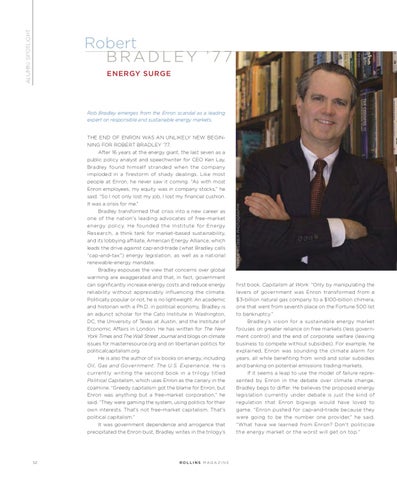ALUMNI SPOTLIGHT
BRADLEY ’77 ENERGY SURGE
THE END OF ENRON WAS AN UNLIKELY NEW BEGINNING FOR ROBERT BRADLEY ’77. After 16 years at the energy giant, the last seven as a public policy analyst and speechwriter for CEO Ken Lay, Bradley found himself stranded when the company imploded in a firestorm of shady dealings. Like most people at Enron, he never saw it coming. “As with most Enron employees, my equity was in company stocks,” he said. “So I not only lost my job, I lost my financial cushion. It was a crisis for me.” Bradley transformed that crisis into a new career as one of the nation’s leading advocates of free-market energy policy. He founded the Institute for Energy Research, a think tank for market-based sustainability, and its lobbying affiliate, American Energy Alliance, which leads the drive against cap-and-trade (what Bradley calls “cap-and-tax”) energy legislation, as well as a national renewable-energy mandate. Bradley espouses the view that concerns over global warming are exaggerated and that, in fact, government can significantly increase energy costs and reduce energy reliability without appreciably influencing the climate. Politically popular or not, he is no lightweight. An academic and historian with a Ph.D. in political economy, Bradley is an adjunct scholar for the Cato Institute in Washington, DC, the University of Texas at Austin, and the Institute of Economic Affairs in London. He has written for The New York Times and The Wall Street Journal and blogs on climate issues for masterresource.org and on libertarian politics for politicalcapitalism.org. He is also the author of six books on energy, including Oil, Gas and Government: The U.S. Experience. He is currently writing the second book in a trilogy titled Political Capitalism, which uses Enron as the canary in the coalmine. “Greedy capitalism got the blame for Enron, but Enron was anything but a free-market corporation,” he said. “They were gaming the system, using politics for their own interests. That’s not free-market capitalism. That’s political capitalism.” It was government dependence and arrogance that precipitated the Enron bust, Bradley writes in the trilogy’s
52
ROLLINS MAGAZINE
TEMPLE WEBBER PHOTOGRAPHY
Rob Bradley emerges from the Enron scandal as a leading expert on responsible and sustainable energy markets.
first book, Capitalism at Work. “Only by manipulating the levers of government was Enron transformed from a $3-billion natural gas company to a $100-billion chimera, one that went from seventh place on the Fortune 500 list to bankruptcy.” Bradley’s vision for a sustainable energy market focuses on greater reliance on free markets (less government control) and the end of corporate welfare (leaving business to compete without subsidies). For example, he explained, Enron was sounding the climate alarm for years, all while benefiting from wind and solar subsidies and banking on potential emissions trading markets. If it seems a leap to use the model of failure represented by Enron in the debate over climate change, Bradley begs to differ. He believes the proposed energy legislation currently under debate is just the kind of regulation that Enron bigwigs would have loved to game. “Enron pushed for cap-and-trade because they were going to be the number one provider,” he said. “What have we learned from Enron? Don’t politicize the energy market or the worst will get on top.”
(l-r) Al Gore, Carter Eskew (strategist from Gore’s 2000 campaign), Frank Hunger (Gore’s brother-in-law), Senator Obama, and Kalee Kreider in Detroit when Gore endorsed Senator Obama for the Presidency.
